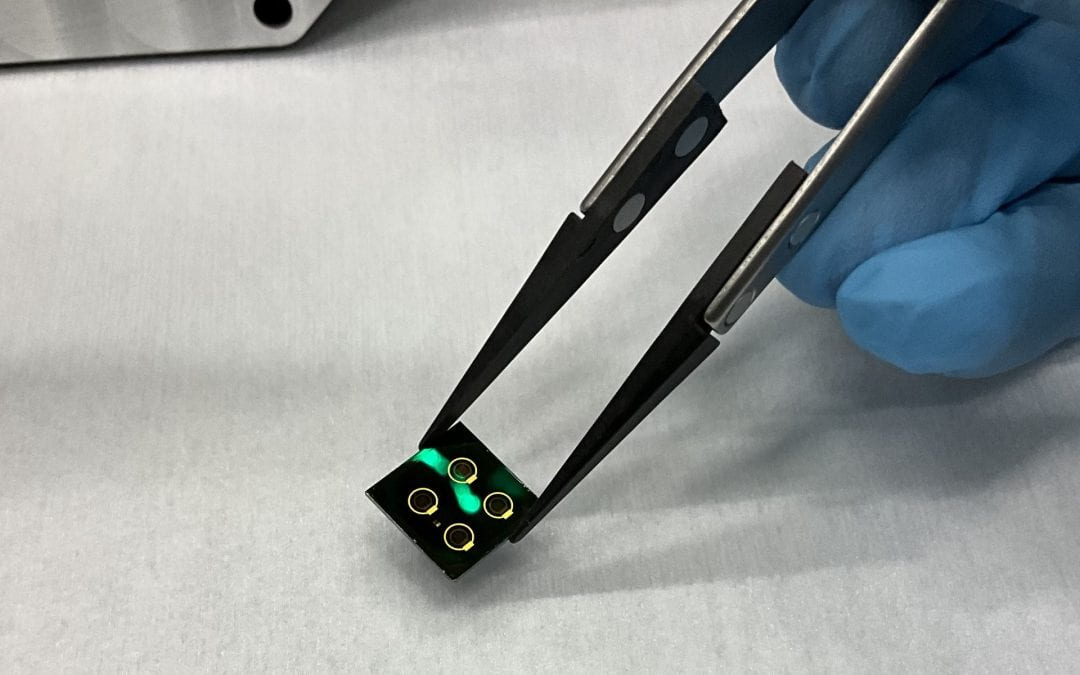A Gallium Arsenide chip containing millions of Induim Arsenide quantum dots, ~10 nanometers in size and not visible to the naked eye. The circular shapes on the chip indicate electrical contact pads used for pristine operation of quantum dots as high-quality quantum light sources.
Boulder, Colorado-based Icarus Quantum is developing on-demand single- and entangled-photon generators for scalable quantum networking applications.
The first stage in creating a scalable quantum network requires the consistent generation of photons, the smallest possible quantum of light. Where do these photons come from? If you ask Poolad Imany, founder and CEO of Icarus Quantum, he’d say from devices developed by his company.
Imany’s quantum startup launched in January 2020, and its leadership team includes Shuo Sun, assistant professor of physics at the University of Colorado-Boulder, who serves as the company’s scientific advisor. Its technology can generate high-quality quantum light and entangled photons reliably and efficiently, in contrast to other generators in the market that work only a fraction of the time and limit the reach of quantum networks.
“The problem with other devices that exist today is that they work probabilistically,” said Imany, “meaning that every time that I want an entangled pair, the probability of getting an entangled pair is very low – about 1 percent. It’s a fundamental limit with these devices because if you try to increase the probability, the quality just drops. That sets a very severe limit on the reach of today’s quantum networks, limiting them to about 100 miles.
“Our devices generate quantum light on demand, or deterministically, meaning this success rate can go up and up. It’s limited by fabrication imperfections, of course, but it doesn’t have a fundamental ceiling anymore. With that, we can extend the reach of quantum networks to even intercontinental distances.”
The company’s technology builds on more than 20 years of research at the National Institute of Standards and Technology (NIST), an official partner of Icarus Quantum. NIST has a reputation as a leader in the development of semiconductor quantum dots that the startup uses in its devices.
“Our group at NIST has a heritage of working on and perfecting quantum dots, which are an excellent source of quantum light” said Imany, who has served as a postdoctoral associate with the institute’s Quantum Nanophtonics Group for more than three years. “After a couple of years, we realized that no one makes these at the quality that we can and that the quality is at a level where we can now take these devices out of the lab and put them in some real-world networks.”
Imany said he sees information security as the most immediate application for his devices, but that they also have implications for a wide range of quantum technologies, including quantum sensors and quantum computers. He aims to have a prototype developed in a year, and a turnkey, user-friendly product that works with fiber optic quantum networks and satellite-based quantum networks in three years.
The company plans to start fundraising within a year, as well, and is looking to establish partnerships that will help accelerate its ability to bring the technology to market. The Duality accelerator provides an opportunity to help the startup achieve its goals, Imany said, and he’s looking forward to making connections with the program’s extensive network of industry, academic, and governmental contacts.
“It’s amazing to be a part of the thriving quantum community that Chicago is building,” he said. “We’re excited to get introduced to potential mentors, business liaisons, and technical mentors, and to branch out and establish some partnerships here and hopefully grow our team.”

